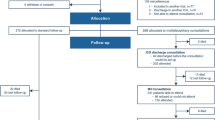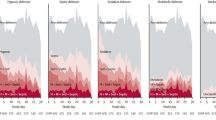Abstract
Background
No matter what type of cognitive impairment an older hospitalized patient has, the risk of mortality is increased.
Objectives
To describe a hospital-based geriatrics program with a focus on any type of cognitive impairment and to determine whether this program was associated with reduced mortality over time.
Design, Participants and Setting
Retrospective chart review of all patients age 70+ admitted during a 3-year period (2017–2019, N=20,401), to a 500-bed community-based hospital (Level 1 Trauma Center and Stroke Center).
Intervention
A multicomponent geriatrics program was developed and implemented throughout 2018 and included: geriatric consultation, data collection, review of the data with hospital leaders, a geriatrics task force, clinician education and a Delirium Unit.
Main Outcomes and Measures
Monthly mortality rates for patients with and without cognitive impairment over the 3-year period. To control for other variables associated with mortality, pre-post implementation analyses were performed (2017 versus 2019).
Results
A linear regression analysis showed a significant downward trend in mortality over time for patients with cognitive impairment [R2=0.4, P<.0001, (correlation coefficient −0.6, 95% CI, −0.8 to −0.4)] but not among patients without cognitive impairment [R2=0.0, P=0.829, (correlation coefficient 0.0, 95% CI, −0.3 to 0.3)]. When controlling for other variables, there was still a decrease in mortality risk among patients with cognitive impairment.
Conclusion
Although there are limitations to this study, a multicomponent geriatrics program with an emphasis on any type of cognitive impairment, may be associated with improved mortality.

Similar content being viewed by others
References
Marcantonio ER. Delirium in hospitalized older adults. N Eng J Med 2017;377:1456–1466. doi:https://doi.org/10.1056/NEJMcp1605501.
Jackson TA, Gladman JR, Harwood RH et al. Challenges and opportunities in understanding dementia and delirium in the acute hospital. PLoS Med 2017;14(3):e1002247. doi: https://doi.org/10.1371/journal.pmed.1002247.
Mukadam N, Sampson EL. A systematic review of the prevalence, associations and outcomes of dementia in older general hospital inpatients. Int Psychogeriatr 2011;23(3):344–355. doi: https://doi.org/10.1017/S1041610210001717.
Sampson EL, Blanchard MR, Jones L, Tookman A, King M. Dementia in the acute hospital: prospective cohort study of prevalence and mortality. Br J Psychiatry 2009;195(1):61–66. doi: https://doi.org/10.1192/bjp.bp.108.055335.
Morandi A, Davis D, Bellelli G et al. The diagnosis of delirium superimposed on dementia: An emerging challenge. J Am Med Dir Assoc 2017;18(1):12–18. doi: https://doi.org/10.1016/j.jamda.2016.07.014.
Morandi A, Di Santo SG, Zambon A et al. Delirium, dementia, and in-hospital mortality: The results from the Italian Delirium Day 2016, A National Multicenter Study J Gerontol A Biol Sci Med Sci 2019;74(6):910–916. doi: https://doi.org/10.1093/gerona/gly154.
Reynish EL, Hapca SM, De Souza N, Cvoro V, Donnan PT, Guthrie B. Epidemiology and outcomes of people with dementia, delirium, and unspecified cognitive impairment in the general hospital: prospective cohort study of 10,014 admissions. BMC Med 2017;15(1):140. doi: https://doi.org/10.1186/s12916-017-0899-0.
Fogg C, Griffiths P, Meredith P, Bridges J. Hospital outcomes of older people with cognitive impairment: An integrative review. Int J Geriatr Psych 2018;33(9);1177–1197. doi: https://doi.org/10.1002/gps.4919.
Devlin, JW, Skrobik Y, Gélinas C et al. Clinical practice guidelines for the prevention and management of pain, agitation/sedation, delirium, immobility, and sleep disruption in adult patients in the ICU. Crit Care Med 2018;46(9):e825–e873. doi: https://doi.org/10.1097/CCM.0000000000003299.
Hshieh TT, Yue J, Oh E et al. Effectiveness of multicomponent nonpharmacological delirium interventions. A meta-analysis. JAMA Intern Med 2015;175(4):512–520. doi: https://doi.org/10.1001/jamainternmed.2014.7779.
Yue J, Tabloski P, Dowal SL, Puelle MR, Nandan R, Inouye SK. NICE to HELP: Operationalizing National Institute for Health and Clinical Excellence Guidelines to improve clinical practice. J Am Geriatr Soc 2014;62(4):754–761. doi: https://doi.org/10.1111/jgs.12768.
Sinvani L, Warner-Cohen J, Strunk A et al. A multicomponent model to improve hospital care of older adults with cognitive impairment: a propensity score-matched analysis. J Am Geriatr Soc 2018;66(9):1700–1707. doi: https://doi.org/10.1111/jgs.15452.
Aung Thein MZ, Pereira JV, Nitchingham A, Caplan GA. A call to action for delirium research: Meta-analysis and regression of delirium associated mortality. BMC Geriatr 2020;20(1):325. doi: https://doi.org/10.1186/s12877-020-01723-4.
Flaherty JH, Little M. Matching the environment to patients with delirium: Lessons learned from the Delirium Room, a restraint-free environment for older hospitalized adults with delirium. J Am Geriatr Soc 2011;59:S295–S300. doi: https://doi.org/10.1111/J.1532-5415.2011.03678.x.
Khan BA, Zawahiri M, Campbell NL et al. Delirium in hospitalized patients: implications of current evidence on clinical practice and future avenues for research—a systematic evidence review. J Hosp Med 2012;7(7):580–589.
American Geriatrics Society Expert Panel on Postoperative Delirium in Older Adults. American Geriatrics Society abstracted clinical practice guideline for postoperative delirium in older adults. J Am Geriatr Soc 2015;63(1):142–150. doi: https://doi.org/10.1002/jhm.1949.
Hessler JB, Schaufele M, Hendlmeier I et al. Behavioural and psychological symptoms in general hospital patients with dementia, distress for nursing staff and complications in care: results of the General Hospital Study. Epidemiol Psychiatr Sci 2018;27(3):278–287. doi: https://doi.org/10.1017/S2045796016001098.
Rohatgi N, Weng Y, Bentley J et al. Initiative for prevention and early identification of delirium in medical-surgical units: Lessons learned in the past five years. Am J Med 2019;132(12):1421–1430. doi: https://doi.org/10.1016/j.amjmed.2019.05.035.
Lundström M, Edlund A, Karlsson S, Brännström B, Bucht G, Gustafson Y. A multifactorial intervention program reduces the duration of delirium, length of hospitalization, and mortality in delirious patients. J Am Geriatr Soc 2005;53(4):622–628. doi: https://doi.org/10.1111/j.1532-5415.2005.53210.x.
Zhang S, Han Y, Xiao Q, Li H, Wu Y. Effectiveness of bundle interventions on ICU delirium: A meta-analysis. Crit Care Med 2021;49(2):335–346. doi: https://doi.org/10.1097/CCM.0000000000004773.
Al-Qadheeb NS, Balk EM, Fraser GL et al. Randomized ICU trials do not demonstrate an association between interventions that reduce delirium duration and short-term mortality: a systematic review and meta-analysis. Crit Care Med 2014;42(6):1442–1454. doi: https://doi.org/10.1097/CCM.0000000000000224.
Trogrlić Z, van der Jagt M, Bakker J et al. A systematic review of implementation strategies for assessment, prevention, and management of ICU delirium and their effect on clinical outcomes. Crit Care 2015;19(1):157. doi: https://doi.org/10.1186/s13054-015-0886-9.
Egberts A, Alan H, Ziere G, Mattace-Raso FUS. Antipsychotics and lorazepam during delirium: Are we harming older patients? A real-life data study. Drugs Aging 2021;38(1):53–62. doi: https://doi.org/10.1007/s40266-020-00813-7.
Practice Guidelines for Moderate Procedural Sedation and Analgesia 2018: A Report by the American Society of Anesthesiologists Task Force on Moderate Procedural Sedation and Analgesia, the American Association of Oral and Maxillofacial Surgeons, American College of Radiology, American Dental Association, American Society of Dentist Anesthesiologists, and Society of Interventional Radiology. Anesthesiology 2018;128(3):437–479. doi: https://doi.org/10.1097/ALN.0000000000002043.
Lonergan E, Luxenberg J, Areosa Sastre A, Wyller TB. Benzodiazepines for delirium. Cochrane Database Syst Rev 2009;(1):CD006379. doi: https://doi.org/10.1002/14651858.CD006379.pub2.
Flaherty JH, Tariq SH, Raghavan S, Bakshi S, Moinuddin A, Morley JE. A model for managing delirious older inpatients. J Am Geriatr Soc 2003;51(7):1031–5. doi: https://doi.org/10.1046/j.1365-2389.2003.51320.x.
Mudge AM, Maussen C, Duncan J et al. Improving quality of delirium care in a general medical service with established interdisciplinary care: A controlled trial. Intern Med J 2013;43(3)270–277. doi: https://doi.org/10.1111/j.1445-5994.2012.02840.x.
Eeles E, Thompson L, McCrow J et al. Management of delirium in medicine: Experience of a close observation unit. Australas J Ageing 2013;32:60–63. doi: https://doi.org/10.1111/ajag.12007.
Wong Tin Niam DM, Geddes JA, Inderjeeth CA. Delirium unit: Our experience. Australas J Ageing 2009;28:206–210. doi: https://doi.org/10.1111/j.1741-6612.2009.00394.x.
Teale E, Young J. Multicomponent delirium prevention not as effective as NICE suggest? Age Ageing 2015;44(6):915–917.
Kim DH, Leeb J, Kim CA. Evaluation of algorithms to identify delirium in administrative claims and drug utilization database. Pharmacoepidemiol Drug Saf 2017;26(8):945–953. doi: https://doi.org/10.1002/pds.4226.
Azar J, Kelley K, Dunscomb J, et al. Using the agile implementation model to reduce central line-associated bloodstream infections. Am J Infect Control 2019;47(1):33–37. doi:https://doi.org/10.1016/j.ajic.2018.07.008
Enns E, Rhemtulla R, Ewa V, Fruetel K, Holroyd-Leduc JM. A controlled Quality Improvement trial to reduce the use of physical restraints in older hospitalized adults. J Am Geriatr Soc 2014;62(3):541–545. doi: https://doi.org/10.1111/jgs.12710.
Acknowledgements
The authors would like to acknowledge Teddy Tran from the hospital’s Financial Department, who was instrumental in acquisition of the data. This paper was presented in part at the 2020 American Delirium Society (virtual) Annual Meeting. The authors would also like to acknowledge the Envision Research Institute for its support of this study.
Funding
Funding: There was no funding for this study.
Author information
Authors and Affiliations
Contributions
Author Contributions: Study conception and design: J.H.F., J.A.B., G.A.S. Data acquisition: J.H.F. Data analysis: J.H.F., J.A.B., E.V., A.B. Data interpretation: J.H.F., J.A.B., E.V., A.B., G.A.S. Writing and critical revision of the manuscript: J.H.F., J.A.B., G.A.S. Final approval of the article: J.H.F., J.A.B., G.A.S.
Corresponding author
Ethics declarations
Conflict of interest: None of the authors have any relevant financial conflicts to disclose.
Ethical standards: Full approval for the research study was obtained by the Hospital Institutional Review Board.
Electronic supplementary material
Rights and permissions
About this article
Cite this article
Flaherty, J.H., Bloomstone, J.A., Vicents Sande, E. et al. An Inpatient Geriatrics Program with a Focus on Any Type of Cognitive Impairment Reduces Mortality. J Nutr Health Aging 26, 103–109 (2022). https://doi.org/10.1007/s12603-021-1709-0
Received:
Accepted:
Published:
Issue Date:
DOI: https://doi.org/10.1007/s12603-021-1709-0




